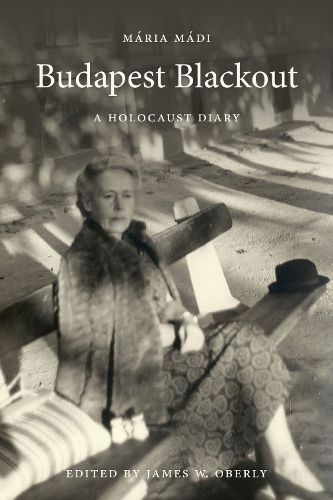Readings Newsletter
Become a Readings Member to make your shopping experience even easier.
Sign in or sign up for free!
You’re not far away from qualifying for FREE standard shipping within Australia
You’ve qualified for FREE standard shipping within Australia
The cart is loading…






This title is printed to order. This book may have been self-published. If so, we cannot guarantee the quality of the content. In the main most books will have gone through the editing process however some may not. We therefore suggest that you be aware of this before ordering this book. If in doubt check either the author or publisher’s details as we are unable to accept any returns unless they are faulty. Please contact us if you have any questions.
MAria MAdi (1898-1970) was a Roman Catholic Hungarian physician living in Budapest during World War II. Stuck in the city, she vowed to become a witness to events as they unfolded and began keeping a diary to chronicle her everyday life, as well as the lives of her Jewish neighbors, during what would be the darkest periods of the Holocaust. From the time Hungary declared war on the United States in December 1941 until she secured an immigrant's visa to the US in late 1946, she wrote nearly daily in English, offering current-day readers one of the most complete pictures of ordinary life during the Holocaust in Hungary. In the form of letters to her American relatives, MAdi addressed a wide range of subjects, from the fate of small countries like Hungary caught between the major powers of Germany and the Soviet Union, to the Nazi pogrom against Budapest's Jews, to family news and the price of food.
MAdi's family donated the entire collection of her diaries to the US Holocaust Memorial Museum. This edition transcribes a selection of MAdi's writings focusing on the period of March 1944 to November 1945, from the Nazi invasion and occupation of Hungary, through the Battle of Budapest, to the ensuing Soviet occupation. While bearing witness to the catastrophe in Hungary, MAdi hid a Jewish family in her small flat from October 1944 to February 1945. She received a posthumous Righteous among Nations Medal from Yad Vashem, the World Holocaust Remembrance Center.
Editorial commentary by James W. Oberly situates MAdi's observations, and a critical introduction by the Holocaust scholar AndrAs LEnArt outlines the wider sociopolitical context in which her diaries gain meaning.
$9.00 standard shipping within Australia
FREE standard shipping within Australia for orders over $100.00
Express & International shipping calculated at checkout
This title is printed to order. This book may have been self-published. If so, we cannot guarantee the quality of the content. In the main most books will have gone through the editing process however some may not. We therefore suggest that you be aware of this before ordering this book. If in doubt check either the author or publisher’s details as we are unable to accept any returns unless they are faulty. Please contact us if you have any questions.
MAria MAdi (1898-1970) was a Roman Catholic Hungarian physician living in Budapest during World War II. Stuck in the city, she vowed to become a witness to events as they unfolded and began keeping a diary to chronicle her everyday life, as well as the lives of her Jewish neighbors, during what would be the darkest periods of the Holocaust. From the time Hungary declared war on the United States in December 1941 until she secured an immigrant's visa to the US in late 1946, she wrote nearly daily in English, offering current-day readers one of the most complete pictures of ordinary life during the Holocaust in Hungary. In the form of letters to her American relatives, MAdi addressed a wide range of subjects, from the fate of small countries like Hungary caught between the major powers of Germany and the Soviet Union, to the Nazi pogrom against Budapest's Jews, to family news and the price of food.
MAdi's family donated the entire collection of her diaries to the US Holocaust Memorial Museum. This edition transcribes a selection of MAdi's writings focusing on the period of March 1944 to November 1945, from the Nazi invasion and occupation of Hungary, through the Battle of Budapest, to the ensuing Soviet occupation. While bearing witness to the catastrophe in Hungary, MAdi hid a Jewish family in her small flat from October 1944 to February 1945. She received a posthumous Righteous among Nations Medal from Yad Vashem, the World Holocaust Remembrance Center.
Editorial commentary by James W. Oberly situates MAdi's observations, and a critical introduction by the Holocaust scholar AndrAs LEnArt outlines the wider sociopolitical context in which her diaries gain meaning.